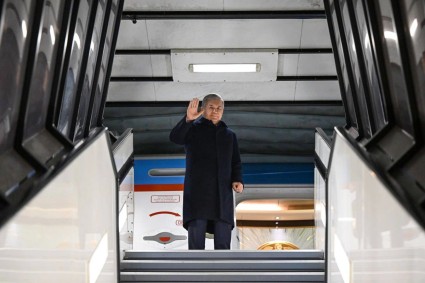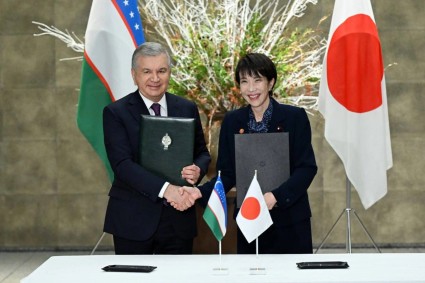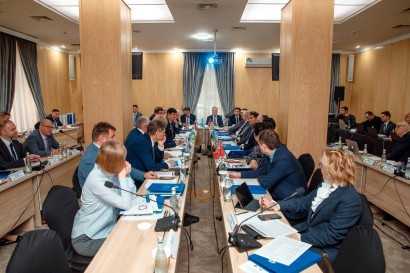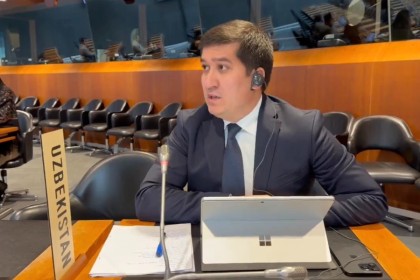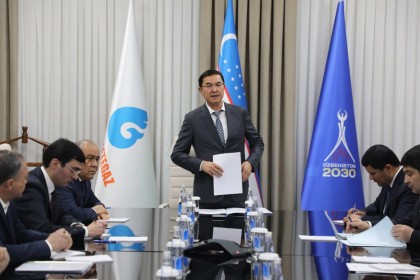The forthcoming Shanghai Cooperation Organisation (SCO) Summit of Heads of State, to be held in Uzbekistan, will ensure that the multilateral body is not just expanded but that the Eurasian region acquire a new strategic dimension, said Dilshod Akhatov, Ambassador of Uzbekistan to India.
In an interview to ThePrint, the Uzbek envoy said Tashkent is looking at tapping the “full potential of the SCO” even as the world undergoes a major geopolitical shift.
“Uzbekistan is interested in fully tapping the potential of the organisation in the new conditions of its evolution, first of all, by increasing the practical cooperation in promising areas that meet the vital interests of all participating countries,” Akhatov said.
This year, the SCO summit is scheduled to be held in Samarkand on 15-16 September. Prime Minister Narendra Modi will be attending it along with Chinese President Xi Jinping and Russian President Vladimir Putin, among others.
“With rapid shifts in the foreign policies of member countries, the SCO is in demand now more than ever. This is because, now, all the member states want this particular multilateral platform to focus on the implementation of an open, pragmatic, broad-based, and mutually beneficial cooperation,” the Uzbek envoy stressed.
According to him, this year, the SCO is focussed on giving the Eurasian region a larger “strategic dimension”, while chalking out a new security order.
“The SCO has an enormous transport and transit potential that awaits its practical implementation. In the context of the diversification of global supply chains, the creation of new international rail and road corridors in Eurasia, along the East-West and North-South directions, is acquiring a strategic dimension,” he said.
The envoy added, “The relevance of SCO is especially growing against the backdrop of aggravated distrust and antagonistic moods in the world. There is, now, mutual understanding and a spirit of cooperation in Eurasia.”
At the end of this year’s summit in Samarkand, India will assume the SCO Presidency from September 2022 for one year till September 2023. In 2023, India will host the next SCO summit.
Iran to be new SCO member
Ambassador Akhatov also confirmed that during this summit Iran will be inducted as the new permanent member of SCO. Currently, the SCO has eight members – China, Kazakhstan, Kyrgyzstan, Russia, Tajikistan, Uzbekistan, India, and Pakistan.
“One of the key issues on the agenda of the summit is the further expansion of the SCO. A memorandum of commitments of the Islamic Republic of Iran to obtain the status of a SCO member-state is already ready for signing. The document will pave the way to a full membership of this large middle-eastern country in our organisation,” Akhatov told ThePrint.
He added that membership applications from about 10 more countries for participation in the SCO activities as full members, observers, and dialogue partners will also be considered.
Iran was earlier one of the observers of the Beijing-headquartered SCO, along with Afghanistan, Belarus, and Mongolia, and six dialogue partners – Turkey, Sri Lanka, Nepal, Cambodia, Azerbaijan, and Armenia.
This is the first expansion of the SCO, seen by some as the counterbalance to NATO, after India and Pakistan were admitted to the grouping in 2017.
“The upcoming summit under the Uzbek chairmanship acquires a special significance by providing a very timely and effective platform for all countries to discuss a whole range of topical issues on the regional and global agenda, thereby opening a new milestone in its evolution,” he said.
The decision to admit Iran as a full member of the SCO was made during last year’s Summit in Dushanbe, where Egypt, Qatar, as well as Saudi Arabia became dialogue partners, SCO Secretary General Zhang Ming had announced in July.
‘Should involve Afghanistan in regional activities’
In July, Uzbekistan hosted two significant meetings on Afghanistan, even as it sought engagement by all regional countries with the Taliban government in power there.
“There is no doubt that Afghanistan is a key factor in ensuring long-term security and stability in the region. Unfortunately, due to the well-known events in the world, there has been a slight decline in the international community’s attention to Afghanistan,” the Uzbek Ambassador said, referring to the ongoing Russia-Ukraine war.
He stressed, “Considering the tragedy of the Afghan people, if the state is left alone with a humanitarian catastrophe, it could lead to new flows of refugees, an increase in drug threats, and a surge in terrorism.”
Besides, he also pointed to the fact that if countries do not engage with the Taliban regime, then, Afghanistan can turn into a “hotbed of instability in the heart of Eurasia”.
“No SCO state is interested in leaving a hotbed of instability in the heart of Eurasia and threats to the security of neighboring countries emanating from the Afghan territory unattended. Today’s realities require that the SCO takes more concrete actions and involves Afghanistan in the regional initiatives, including the infrastructure projects,” he highlighted.
Thus, he said, promoting the “development of consolidated approaches within the SCO”, in relation to the post-war development strategy of Afghanistan, has been one of the key priorities of Uzbekistan’s chairmanship.

